Australian Immigration Law: Anna Do's Visa Cancellation Case Study
VerifiedAdded on 2021/06/17
|8
|1968
|151
Case Study
AI Summary
This case study analyzes the cancellation of Anna Do's student visa (subclass 500) under the Australian Migration Act 1958. The Minister for Immigration and Border Protection cancelled her visa based on the belief that she posed a risk to the health, safety, and good order of the Australian community, due to criminal proceedings related to the death of her former employer. The analysis examines the validity of the cancellation under Section 116 (1) (e) and Section 116 (1) (a) of the Act, considering her pending criminal charges and her stated lack of intention to continue her studies. The document explores the powers conferred to the Minister, the grounds for cancellation, and the potential challenges to the decision, including the role of the Administrative Appeals Tribunal (AAT). The case highlights the discretionary powers of the Minister and the legal complexities surrounding visa cancellations based on perceived risks.
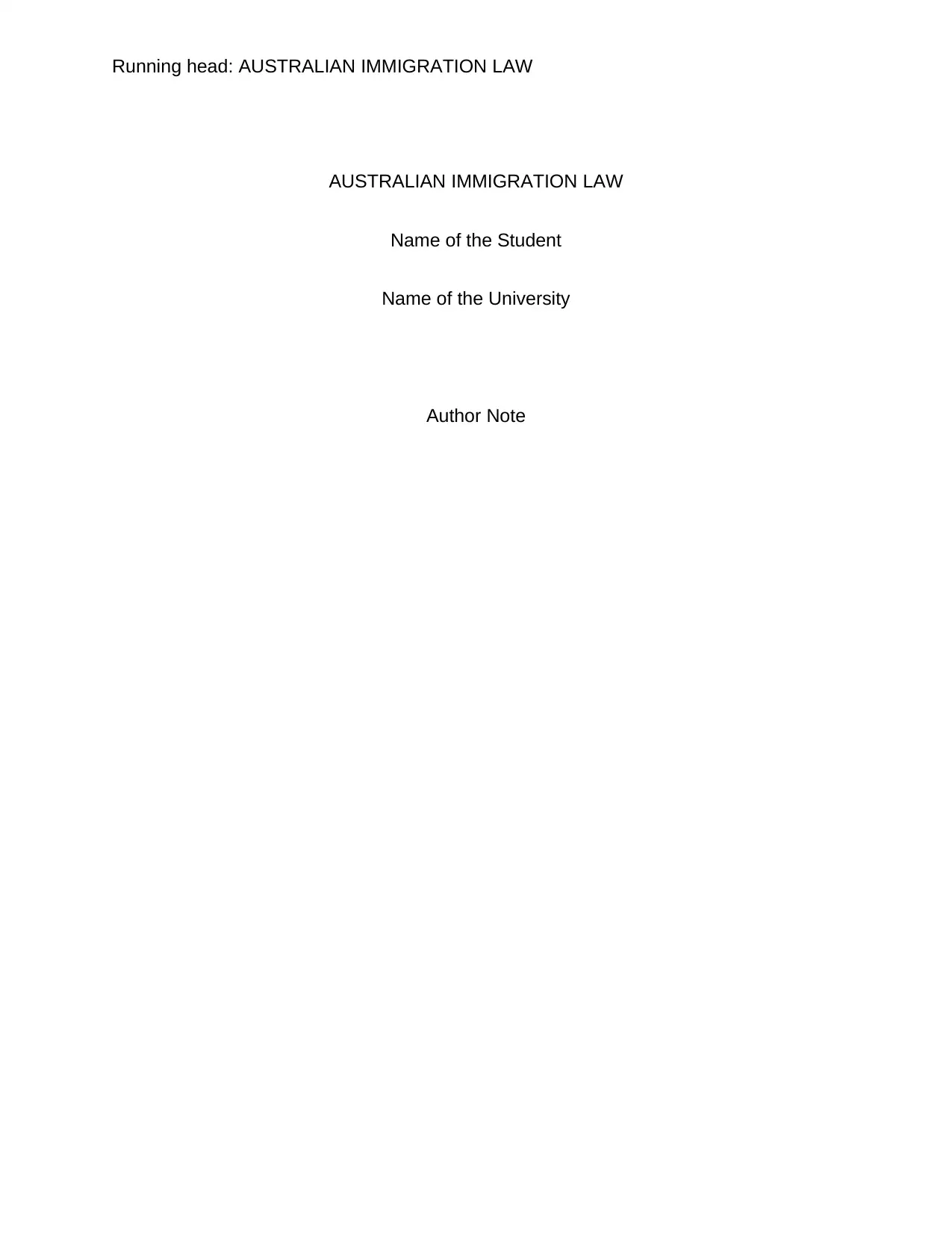
Running head: AUSTRALIAN IMMIGRATION LAW
AUSTRALIAN IMMIGRATION LAW
Name of the Student
Name of the University
Author Note
AUSTRALIAN IMMIGRATION LAW
Name of the Student
Name of the University
Author Note
Paraphrase This Document
Need a fresh take? Get an instant paraphrase of this document with our AI Paraphraser
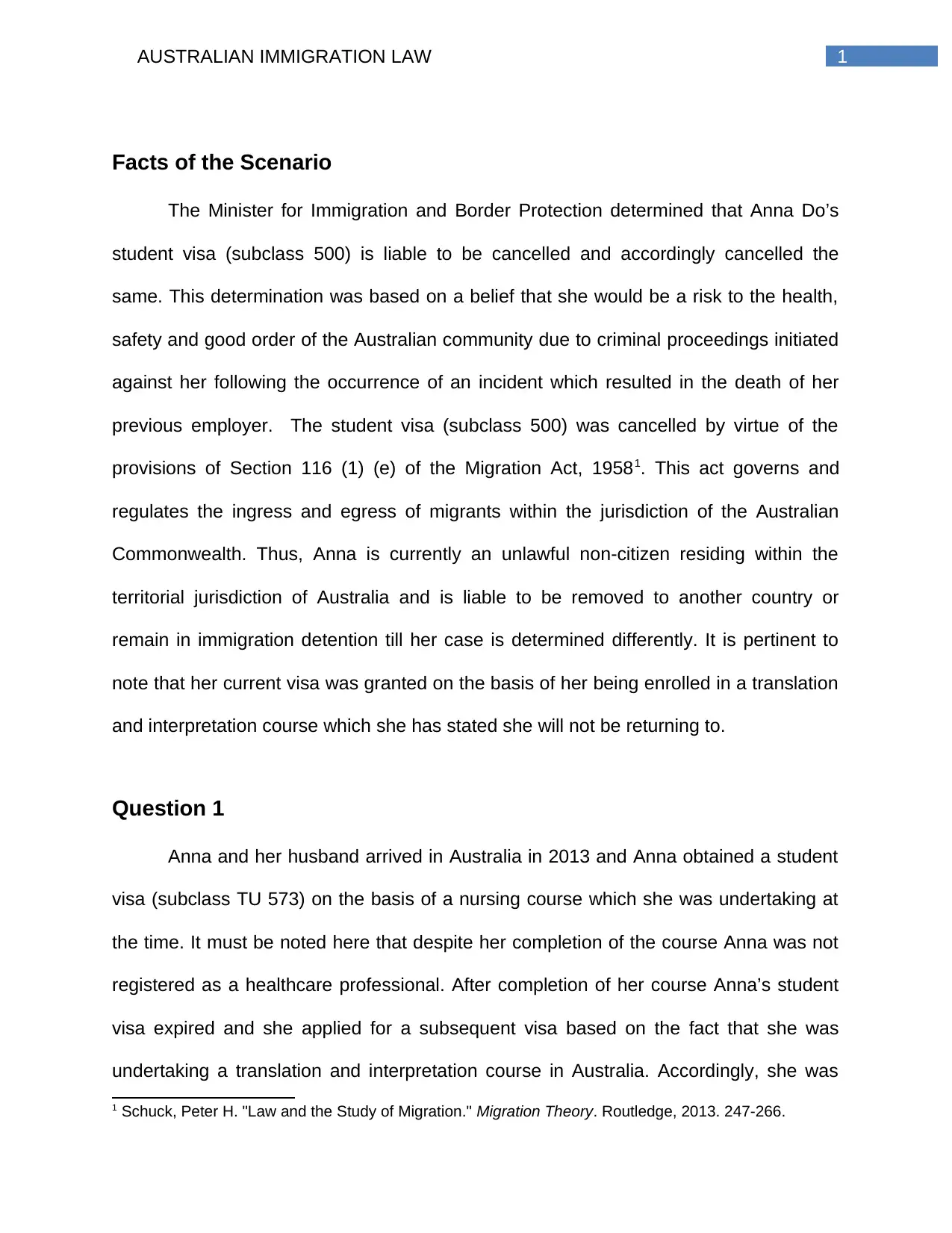
1AUSTRALIAN IMMIGRATION LAW
Facts of the Scenario
The Minister for Immigration and Border Protection determined that Anna Do’s
student visa (subclass 500) is liable to be cancelled and accordingly cancelled the
same. This determination was based on a belief that she would be a risk to the health,
safety and good order of the Australian community due to criminal proceedings initiated
against her following the occurrence of an incident which resulted in the death of her
previous employer. The student visa (subclass 500) was cancelled by virtue of the
provisions of Section 116 (1) (e) of the Migration Act, 19581. This act governs and
regulates the ingress and egress of migrants within the jurisdiction of the Australian
Commonwealth. Thus, Anna is currently an unlawful non-citizen residing within the
territorial jurisdiction of Australia and is liable to be removed to another country or
remain in immigration detention till her case is determined differently. It is pertinent to
note that her current visa was granted on the basis of her being enrolled in a translation
and interpretation course which she has stated she will not be returning to.
Question 1
Anna and her husband arrived in Australia in 2013 and Anna obtained a student
visa (subclass TU 573) on the basis of a nursing course which she was undertaking at
the time. It must be noted here that despite her completion of the course Anna was not
registered as a healthcare professional. After completion of her course Anna’s student
visa expired and she applied for a subsequent visa based on the fact that she was
undertaking a translation and interpretation course in Australia. Accordingly, she was
1 Schuck, Peter H. "Law and the Study of Migration." Migration Theory. Routledge, 2013. 247-266.
Facts of the Scenario
The Minister for Immigration and Border Protection determined that Anna Do’s
student visa (subclass 500) is liable to be cancelled and accordingly cancelled the
same. This determination was based on a belief that she would be a risk to the health,
safety and good order of the Australian community due to criminal proceedings initiated
against her following the occurrence of an incident which resulted in the death of her
previous employer. The student visa (subclass 500) was cancelled by virtue of the
provisions of Section 116 (1) (e) of the Migration Act, 19581. This act governs and
regulates the ingress and egress of migrants within the jurisdiction of the Australian
Commonwealth. Thus, Anna is currently an unlawful non-citizen residing within the
territorial jurisdiction of Australia and is liable to be removed to another country or
remain in immigration detention till her case is determined differently. It is pertinent to
note that her current visa was granted on the basis of her being enrolled in a translation
and interpretation course which she has stated she will not be returning to.
Question 1
Anna and her husband arrived in Australia in 2013 and Anna obtained a student
visa (subclass TU 573) on the basis of a nursing course which she was undertaking at
the time. It must be noted here that despite her completion of the course Anna was not
registered as a healthcare professional. After completion of her course Anna’s student
visa expired and she applied for a subsequent visa based on the fact that she was
undertaking a translation and interpretation course in Australia. Accordingly, she was
1 Schuck, Peter H. "Law and the Study of Migration." Migration Theory. Routledge, 2013. 247-266.
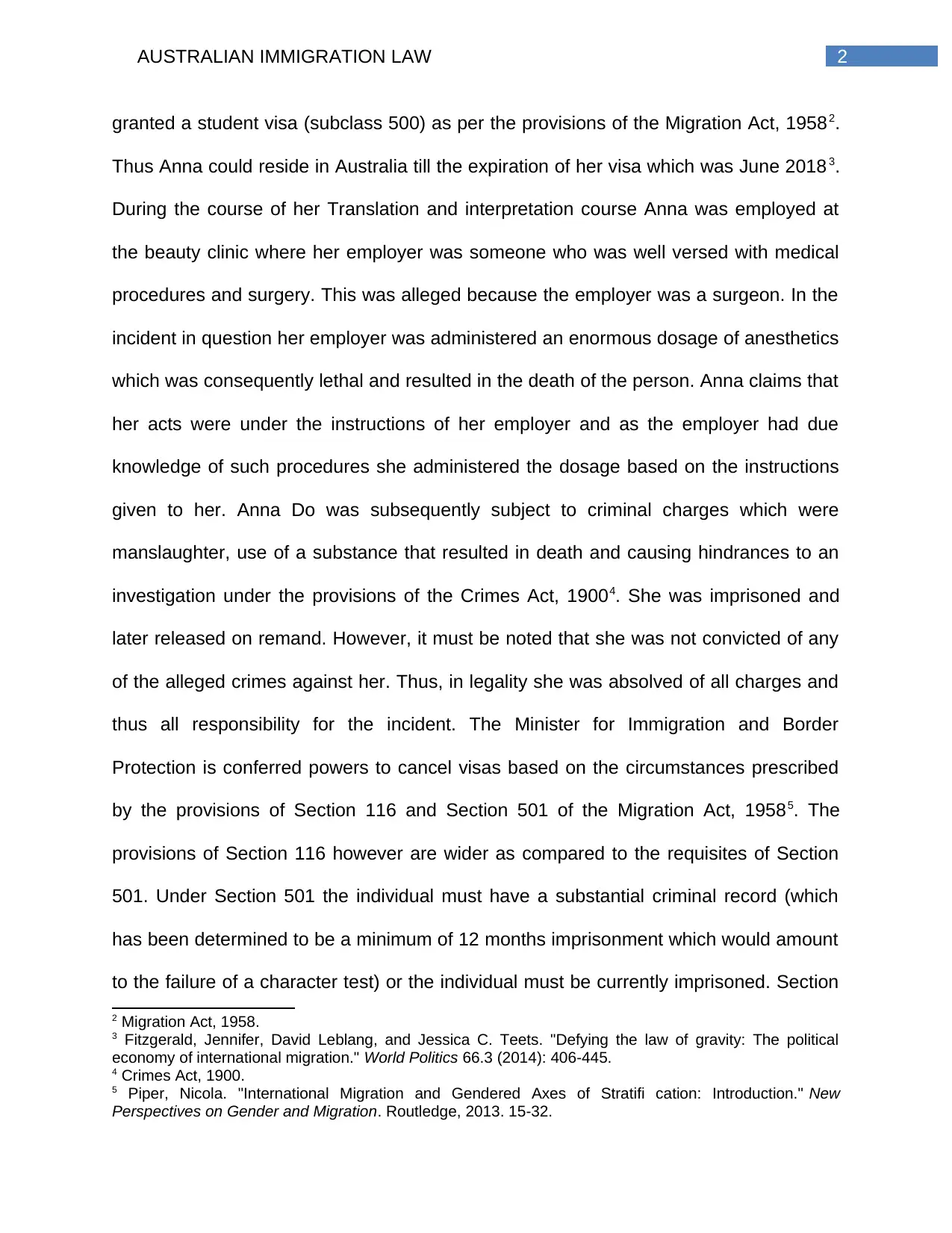
2AUSTRALIAN IMMIGRATION LAW
granted a student visa (subclass 500) as per the provisions of the Migration Act, 19582.
Thus Anna could reside in Australia till the expiration of her visa which was June 2018 3.
During the course of her Translation and interpretation course Anna was employed at
the beauty clinic where her employer was someone who was well versed with medical
procedures and surgery. This was alleged because the employer was a surgeon. In the
incident in question her employer was administered an enormous dosage of anesthetics
which was consequently lethal and resulted in the death of the person. Anna claims that
her acts were under the instructions of her employer and as the employer had due
knowledge of such procedures she administered the dosage based on the instructions
given to her. Anna Do was subsequently subject to criminal charges which were
manslaughter, use of a substance that resulted in death and causing hindrances to an
investigation under the provisions of the Crimes Act, 19004. She was imprisoned and
later released on remand. However, it must be noted that she was not convicted of any
of the alleged crimes against her. Thus, in legality she was absolved of all charges and
thus all responsibility for the incident. The Minister for Immigration and Border
Protection is conferred powers to cancel visas based on the circumstances prescribed
by the provisions of Section 116 and Section 501 of the Migration Act, 19585. The
provisions of Section 116 however are wider as compared to the requisites of Section
501. Under Section 501 the individual must have a substantial criminal record (which
has been determined to be a minimum of 12 months imprisonment which would amount
to the failure of a character test) or the individual must be currently imprisoned. Section
2 Migration Act, 1958.
3 Fitzgerald, Jennifer, David Leblang, and Jessica C. Teets. "Defying the law of gravity: The political
economy of international migration." World Politics 66.3 (2014): 406-445.
4 Crimes Act, 1900.
5 Piper, Nicola. "International Migration and Gendered Axes of Stratifi cation: Introduction." New
Perspectives on Gender and Migration. Routledge, 2013. 15-32.
granted a student visa (subclass 500) as per the provisions of the Migration Act, 19582.
Thus Anna could reside in Australia till the expiration of her visa which was June 2018 3.
During the course of her Translation and interpretation course Anna was employed at
the beauty clinic where her employer was someone who was well versed with medical
procedures and surgery. This was alleged because the employer was a surgeon. In the
incident in question her employer was administered an enormous dosage of anesthetics
which was consequently lethal and resulted in the death of the person. Anna claims that
her acts were under the instructions of her employer and as the employer had due
knowledge of such procedures she administered the dosage based on the instructions
given to her. Anna Do was subsequently subject to criminal charges which were
manslaughter, use of a substance that resulted in death and causing hindrances to an
investigation under the provisions of the Crimes Act, 19004. She was imprisoned and
later released on remand. However, it must be noted that she was not convicted of any
of the alleged crimes against her. Thus, in legality she was absolved of all charges and
thus all responsibility for the incident. The Minister for Immigration and Border
Protection is conferred powers to cancel visas based on the circumstances prescribed
by the provisions of Section 116 and Section 501 of the Migration Act, 19585. The
provisions of Section 116 however are wider as compared to the requisites of Section
501. Under Section 501 the individual must have a substantial criminal record (which
has been determined to be a minimum of 12 months imprisonment which would amount
to the failure of a character test) or the individual must be currently imprisoned. Section
2 Migration Act, 1958.
3 Fitzgerald, Jennifer, David Leblang, and Jessica C. Teets. "Defying the law of gravity: The political
economy of international migration." World Politics 66.3 (2014): 406-445.
4 Crimes Act, 1900.
5 Piper, Nicola. "International Migration and Gendered Axes of Stratifi cation: Introduction." New
Perspectives on Gender and Migration. Routledge, 2013. 15-32.
⊘ This is a preview!⊘
Do you want full access?
Subscribe today to unlock all pages.

Trusted by 1+ million students worldwide
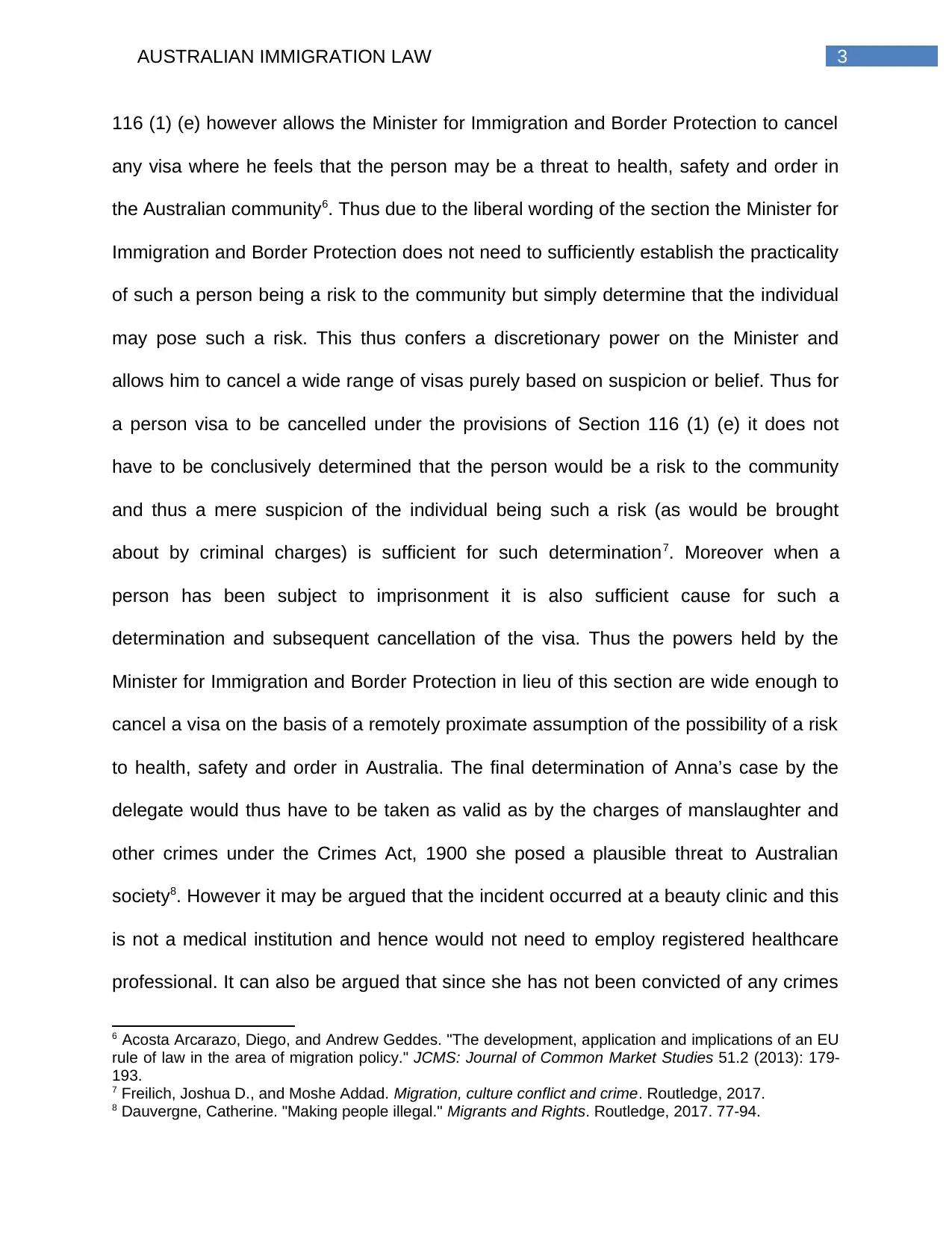
3AUSTRALIAN IMMIGRATION LAW
116 (1) (e) however allows the Minister for Immigration and Border Protection to cancel
any visa where he feels that the person may be a threat to health, safety and order in
the Australian community6. Thus due to the liberal wording of the section the Minister for
Immigration and Border Protection does not need to sufficiently establish the practicality
of such a person being a risk to the community but simply determine that the individual
may pose such a risk. This thus confers a discretionary power on the Minister and
allows him to cancel a wide range of visas purely based on suspicion or belief. Thus for
a person visa to be cancelled under the provisions of Section 116 (1) (e) it does not
have to be conclusively determined that the person would be a risk to the community
and thus a mere suspicion of the individual being such a risk (as would be brought
about by criminal charges) is sufficient for such determination7. Moreover when a
person has been subject to imprisonment it is also sufficient cause for such a
determination and subsequent cancellation of the visa. Thus the powers held by the
Minister for Immigration and Border Protection in lieu of this section are wide enough to
cancel a visa on the basis of a remotely proximate assumption of the possibility of a risk
to health, safety and order in Australia. The final determination of Anna’s case by the
delegate would thus have to be taken as valid as by the charges of manslaughter and
other crimes under the Crimes Act, 1900 she posed a plausible threat to Australian
society8. However it may be argued that the incident occurred at a beauty clinic and this
is not a medical institution and hence would not need to employ registered healthcare
professional. It can also be argued that since she has not been convicted of any crimes
6 Acosta Arcarazo, Diego, and Andrew Geddes. "The development, application and implications of an EU
rule of law in the area of migration policy." JCMS: Journal of Common Market Studies 51.2 (2013): 179-
193.
7 Freilich, Joshua D., and Moshe Addad. Migration, culture conflict and crime. Routledge, 2017.
8 Dauvergne, Catherine. "Making people illegal." Migrants and Rights. Routledge, 2017. 77-94.
116 (1) (e) however allows the Minister for Immigration and Border Protection to cancel
any visa where he feels that the person may be a threat to health, safety and order in
the Australian community6. Thus due to the liberal wording of the section the Minister for
Immigration and Border Protection does not need to sufficiently establish the practicality
of such a person being a risk to the community but simply determine that the individual
may pose such a risk. This thus confers a discretionary power on the Minister and
allows him to cancel a wide range of visas purely based on suspicion or belief. Thus for
a person visa to be cancelled under the provisions of Section 116 (1) (e) it does not
have to be conclusively determined that the person would be a risk to the community
and thus a mere suspicion of the individual being such a risk (as would be brought
about by criminal charges) is sufficient for such determination7. Moreover when a
person has been subject to imprisonment it is also sufficient cause for such a
determination and subsequent cancellation of the visa. Thus the powers held by the
Minister for Immigration and Border Protection in lieu of this section are wide enough to
cancel a visa on the basis of a remotely proximate assumption of the possibility of a risk
to health, safety and order in Australia. The final determination of Anna’s case by the
delegate would thus have to be taken as valid as by the charges of manslaughter and
other crimes under the Crimes Act, 1900 she posed a plausible threat to Australian
society8. However it may be argued that the incident occurred at a beauty clinic and this
is not a medical institution and hence would not need to employ registered healthcare
professional. It can also be argued that since she has not been convicted of any crimes
6 Acosta Arcarazo, Diego, and Andrew Geddes. "The development, application and implications of an EU
rule of law in the area of migration policy." JCMS: Journal of Common Market Studies 51.2 (2013): 179-
193.
7 Freilich, Joshua D., and Moshe Addad. Migration, culture conflict and crime. Routledge, 2017.
8 Dauvergne, Catherine. "Making people illegal." Migrants and Rights. Routledge, 2017. 77-94.
Paraphrase This Document
Need a fresh take? Get an instant paraphrase of this document with our AI Paraphraser
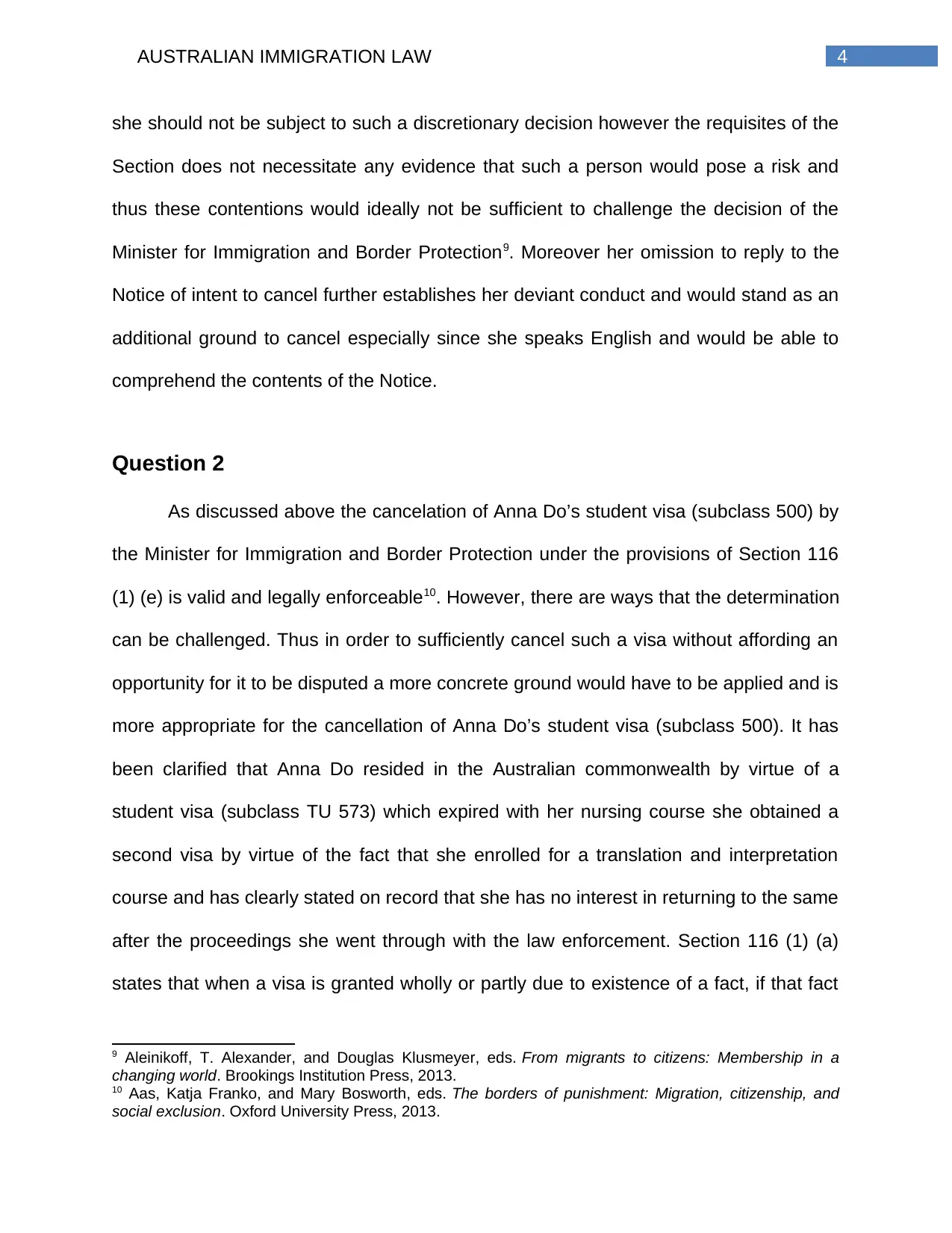
4AUSTRALIAN IMMIGRATION LAW
she should not be subject to such a discretionary decision however the requisites of the
Section does not necessitate any evidence that such a person would pose a risk and
thus these contentions would ideally not be sufficient to challenge the decision of the
Minister for Immigration and Border Protection9. Moreover her omission to reply to the
Notice of intent to cancel further establishes her deviant conduct and would stand as an
additional ground to cancel especially since she speaks English and would be able to
comprehend the contents of the Notice.
Question 2
As discussed above the cancelation of Anna Do’s student visa (subclass 500) by
the Minister for Immigration and Border Protection under the provisions of Section 116
(1) (e) is valid and legally enforceable10. However, there are ways that the determination
can be challenged. Thus in order to sufficiently cancel such a visa without affording an
opportunity for it to be disputed a more concrete ground would have to be applied and is
more appropriate for the cancellation of Anna Do’s student visa (subclass 500). It has
been clarified that Anna Do resided in the Australian commonwealth by virtue of a
student visa (subclass TU 573) which expired with her nursing course she obtained a
second visa by virtue of the fact that she enrolled for a translation and interpretation
course and has clearly stated on record that she has no interest in returning to the same
after the proceedings she went through with the law enforcement. Section 116 (1) (a)
states that when a visa is granted wholly or partly due to existence of a fact, if that fact
9 Aleinikoff, T. Alexander, and Douglas Klusmeyer, eds. From migrants to citizens: Membership in a
changing world. Brookings Institution Press, 2013.
10 Aas, Katja Franko, and Mary Bosworth, eds. The borders of punishment: Migration, citizenship, and
social exclusion. Oxford University Press, 2013.
she should not be subject to such a discretionary decision however the requisites of the
Section does not necessitate any evidence that such a person would pose a risk and
thus these contentions would ideally not be sufficient to challenge the decision of the
Minister for Immigration and Border Protection9. Moreover her omission to reply to the
Notice of intent to cancel further establishes her deviant conduct and would stand as an
additional ground to cancel especially since she speaks English and would be able to
comprehend the contents of the Notice.
Question 2
As discussed above the cancelation of Anna Do’s student visa (subclass 500) by
the Minister for Immigration and Border Protection under the provisions of Section 116
(1) (e) is valid and legally enforceable10. However, there are ways that the determination
can be challenged. Thus in order to sufficiently cancel such a visa without affording an
opportunity for it to be disputed a more concrete ground would have to be applied and is
more appropriate for the cancellation of Anna Do’s student visa (subclass 500). It has
been clarified that Anna Do resided in the Australian commonwealth by virtue of a
student visa (subclass TU 573) which expired with her nursing course she obtained a
second visa by virtue of the fact that she enrolled for a translation and interpretation
course and has clearly stated on record that she has no interest in returning to the same
after the proceedings she went through with the law enforcement. Section 116 (1) (a)
states that when a visa is granted wholly or partly due to existence of a fact, if that fact
9 Aleinikoff, T. Alexander, and Douglas Klusmeyer, eds. From migrants to citizens: Membership in a
changing world. Brookings Institution Press, 2013.
10 Aas, Katja Franko, and Mary Bosworth, eds. The borders of punishment: Migration, citizenship, and
social exclusion. Oxford University Press, 2013.
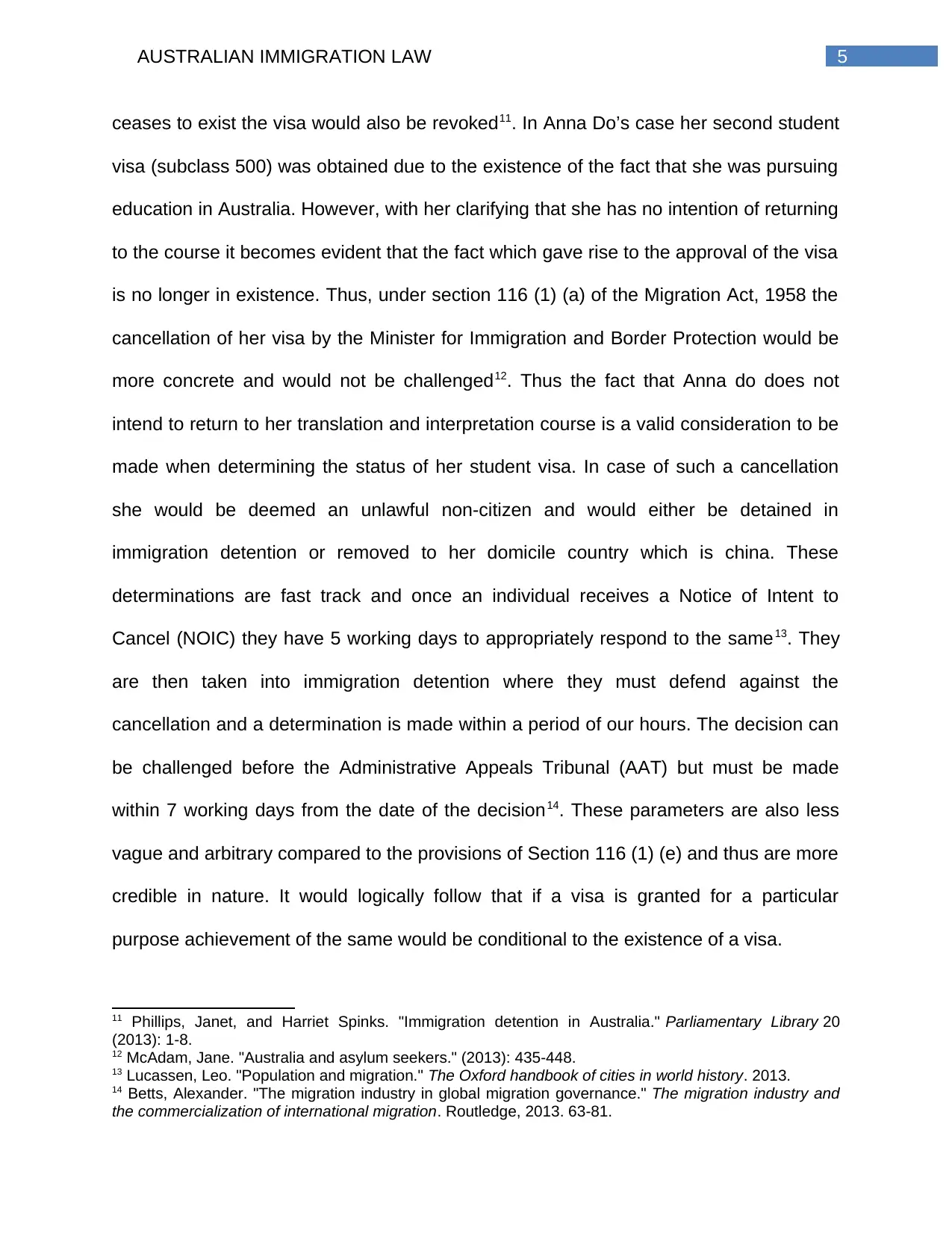
5AUSTRALIAN IMMIGRATION LAW
ceases to exist the visa would also be revoked11. In Anna Do’s case her second student
visa (subclass 500) was obtained due to the existence of the fact that she was pursuing
education in Australia. However, with her clarifying that she has no intention of returning
to the course it becomes evident that the fact which gave rise to the approval of the visa
is no longer in existence. Thus, under section 116 (1) (a) of the Migration Act, 1958 the
cancellation of her visa by the Minister for Immigration and Border Protection would be
more concrete and would not be challenged12. Thus the fact that Anna do does not
intend to return to her translation and interpretation course is a valid consideration to be
made when determining the status of her student visa. In case of such a cancellation
she would be deemed an unlawful non-citizen and would either be detained in
immigration detention or removed to her domicile country which is china. These
determinations are fast track and once an individual receives a Notice of Intent to
Cancel (NOIC) they have 5 working days to appropriately respond to the same13. They
are then taken into immigration detention where they must defend against the
cancellation and a determination is made within a period of our hours. The decision can
be challenged before the Administrative Appeals Tribunal (AAT) but must be made
within 7 working days from the date of the decision14. These parameters are also less
vague and arbitrary compared to the provisions of Section 116 (1) (e) and thus are more
credible in nature. It would logically follow that if a visa is granted for a particular
purpose achievement of the same would be conditional to the existence of a visa.
11 Phillips, Janet, and Harriet Spinks. "Immigration detention in Australia." Parliamentary Library 20
(2013): 1-8.
12 McAdam, Jane. "Australia and asylum seekers." (2013): 435-448.
13 Lucassen, Leo. "Population and migration." The Oxford handbook of cities in world history. 2013.
14 Betts, Alexander. "The migration industry in global migration governance." The migration industry and
the commercialization of international migration. Routledge, 2013. 63-81.
ceases to exist the visa would also be revoked11. In Anna Do’s case her second student
visa (subclass 500) was obtained due to the existence of the fact that she was pursuing
education in Australia. However, with her clarifying that she has no intention of returning
to the course it becomes evident that the fact which gave rise to the approval of the visa
is no longer in existence. Thus, under section 116 (1) (a) of the Migration Act, 1958 the
cancellation of her visa by the Minister for Immigration and Border Protection would be
more concrete and would not be challenged12. Thus the fact that Anna do does not
intend to return to her translation and interpretation course is a valid consideration to be
made when determining the status of her student visa. In case of such a cancellation
she would be deemed an unlawful non-citizen and would either be detained in
immigration detention or removed to her domicile country which is china. These
determinations are fast track and once an individual receives a Notice of Intent to
Cancel (NOIC) they have 5 working days to appropriately respond to the same13. They
are then taken into immigration detention where they must defend against the
cancellation and a determination is made within a period of our hours. The decision can
be challenged before the Administrative Appeals Tribunal (AAT) but must be made
within 7 working days from the date of the decision14. These parameters are also less
vague and arbitrary compared to the provisions of Section 116 (1) (e) and thus are more
credible in nature. It would logically follow that if a visa is granted for a particular
purpose achievement of the same would be conditional to the existence of a visa.
11 Phillips, Janet, and Harriet Spinks. "Immigration detention in Australia." Parliamentary Library 20
(2013): 1-8.
12 McAdam, Jane. "Australia and asylum seekers." (2013): 435-448.
13 Lucassen, Leo. "Population and migration." The Oxford handbook of cities in world history. 2013.
14 Betts, Alexander. "The migration industry in global migration governance." The migration industry and
the commercialization of international migration. Routledge, 2013. 63-81.
⊘ This is a preview!⊘
Do you want full access?
Subscribe today to unlock all pages.

Trusted by 1+ million students worldwide
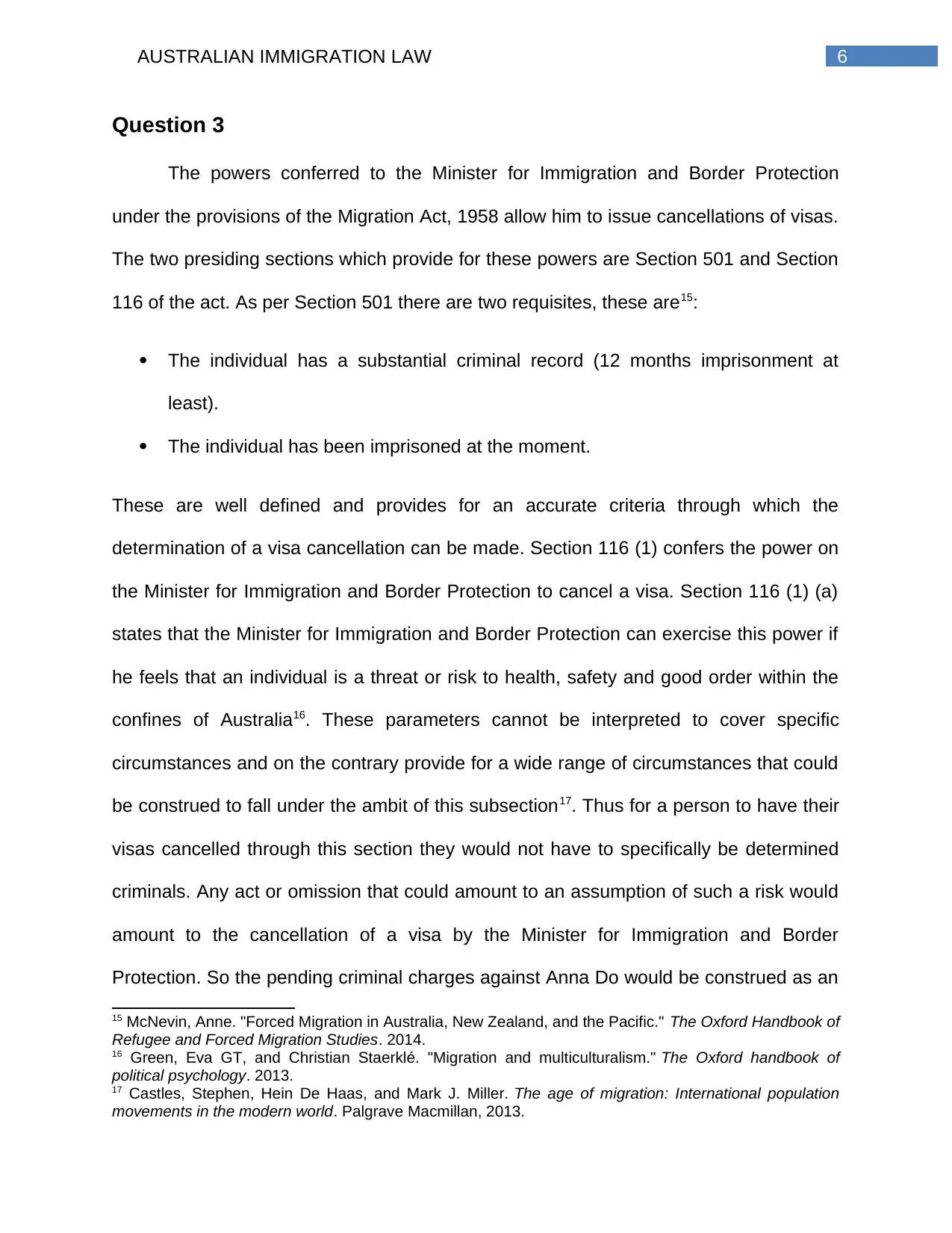
6AUSTRALIAN IMMIGRATION LAW
Question 3
The powers conferred to the Minister for Immigration and Border Protection
under the provisions of the Migration Act, 1958 allow him to issue cancellations of visas.
The two presiding sections which provide for these powers are Section 501 and Section
116 of the act. As per Section 501 there are two requisites, these are15:
The individual has a substantial criminal record (12 months imprisonment at
least).
The individual has been imprisoned at the moment.
These are well defined and provides for an accurate criteria through which the
determination of a visa cancellation can be made. Section 116 (1) confers the power on
the Minister for Immigration and Border Protection to cancel a visa. Section 116 (1) (a)
states that the Minister for Immigration and Border Protection can exercise this power if
he feels that an individual is a threat or risk to health, safety and good order within the
confines of Australia16. These parameters cannot be interpreted to cover specific
circumstances and on the contrary provide for a wide range of circumstances that could
be construed to fall under the ambit of this subsection17. Thus for a person to have their
visas cancelled through this section they would not have to specifically be determined
criminals. Any act or omission that could amount to an assumption of such a risk would
amount to the cancellation of a visa by the Minister for Immigration and Border
Protection. So the pending criminal charges against Anna Do would be construed as an
15 McNevin, Anne. "Forced Migration in Australia, New Zealand, and the Pacific." The Oxford Handbook of
Refugee and Forced Migration Studies. 2014.
16 Green, Eva GT, and Christian Staerklé. "Migration and multiculturalism." The Oxford handbook of
political psychology. 2013.
17 Castles, Stephen, Hein De Haas, and Mark J. Miller. The age of migration: International population
movements in the modern world. Palgrave Macmillan, 2013.
Question 3
The powers conferred to the Minister for Immigration and Border Protection
under the provisions of the Migration Act, 1958 allow him to issue cancellations of visas.
The two presiding sections which provide for these powers are Section 501 and Section
116 of the act. As per Section 501 there are two requisites, these are15:
The individual has a substantial criminal record (12 months imprisonment at
least).
The individual has been imprisoned at the moment.
These are well defined and provides for an accurate criteria through which the
determination of a visa cancellation can be made. Section 116 (1) confers the power on
the Minister for Immigration and Border Protection to cancel a visa. Section 116 (1) (a)
states that the Minister for Immigration and Border Protection can exercise this power if
he feels that an individual is a threat or risk to health, safety and good order within the
confines of Australia16. These parameters cannot be interpreted to cover specific
circumstances and on the contrary provide for a wide range of circumstances that could
be construed to fall under the ambit of this subsection17. Thus for a person to have their
visas cancelled through this section they would not have to specifically be determined
criminals. Any act or omission that could amount to an assumption of such a risk would
amount to the cancellation of a visa by the Minister for Immigration and Border
Protection. So the pending criminal charges against Anna Do would be construed as an
15 McNevin, Anne. "Forced Migration in Australia, New Zealand, and the Pacific." The Oxford Handbook of
Refugee and Forced Migration Studies. 2014.
16 Green, Eva GT, and Christian Staerklé. "Migration and multiculturalism." The Oxford handbook of
political psychology. 2013.
17 Castles, Stephen, Hein De Haas, and Mark J. Miller. The age of migration: International population
movements in the modern world. Palgrave Macmillan, 2013.
Paraphrase This Document
Need a fresh take? Get an instant paraphrase of this document with our AI Paraphraser
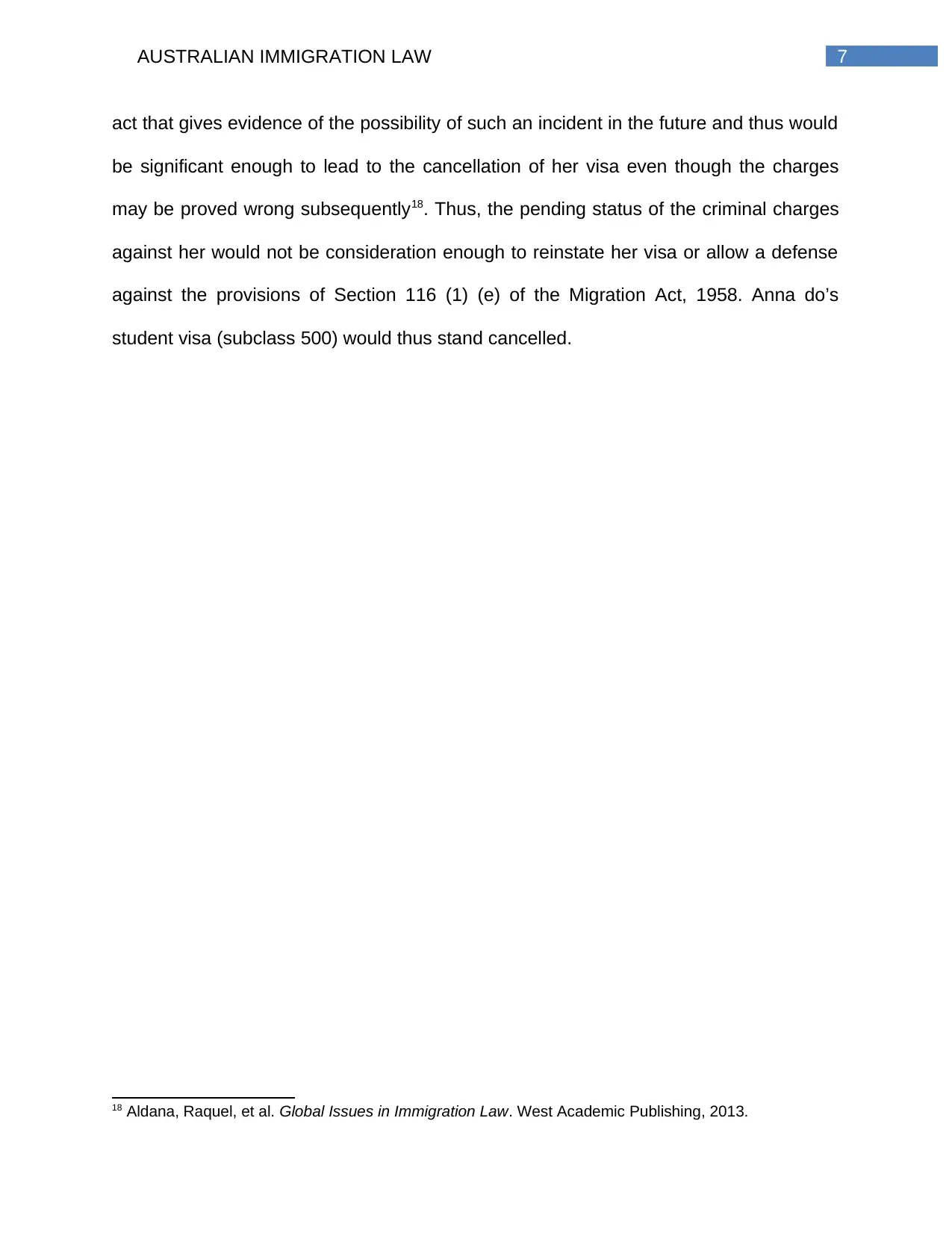
7AUSTRALIAN IMMIGRATION LAW
act that gives evidence of the possibility of such an incident in the future and thus would
be significant enough to lead to the cancellation of her visa even though the charges
may be proved wrong subsequently18. Thus, the pending status of the criminal charges
against her would not be consideration enough to reinstate her visa or allow a defense
against the provisions of Section 116 (1) (e) of the Migration Act, 1958. Anna do’s
student visa (subclass 500) would thus stand cancelled.
18 Aldana, Raquel, et al. Global Issues in Immigration Law. West Academic Publishing, 2013.
act that gives evidence of the possibility of such an incident in the future and thus would
be significant enough to lead to the cancellation of her visa even though the charges
may be proved wrong subsequently18. Thus, the pending status of the criminal charges
against her would not be consideration enough to reinstate her visa or allow a defense
against the provisions of Section 116 (1) (e) of the Migration Act, 1958. Anna do’s
student visa (subclass 500) would thus stand cancelled.
18 Aldana, Raquel, et al. Global Issues in Immigration Law. West Academic Publishing, 2013.
1 out of 8
Related Documents
Your All-in-One AI-Powered Toolkit for Academic Success.
+13062052269
info@desklib.com
Available 24*7 on WhatsApp / Email
![[object Object]](/_next/static/media/star-bottom.7253800d.svg)
Unlock your academic potential
Copyright © 2020–2026 A2Z Services. All Rights Reserved. Developed and managed by ZUCOL.





